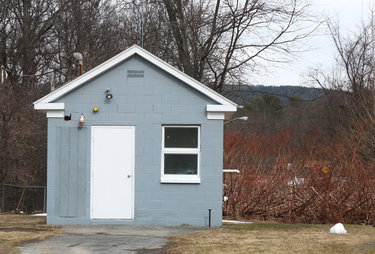Sewer rates set to increase for Altamont users
Enterprise file photo — Michael Koff
Altamont’s wastewater treatment facility is on Gun Club Road. The village is not taking in enough sewer revenue to cover its expenses, and is going to have to raise the fee it charges customers to repay the multi-million bond it took out in 2013 upgrade the decades-old facility.
ALTAMONT — The Altamont Board of Trustees recently came to a unanimous agreement that its first in-person meeting in well over a year would be a public hearing on fee hikes for the village’s nearly 900 sewer customers.
The board at its June 1 meeting set the hearing for July 2o, at 7 p.m., at village hall.
The Altamont Planning Board is also set to get back to normal, with its June 28 meeting set to be in-person; the meeting starts at 7 p.m., and is also at village hall.
Mayor Kerry Dineen said during the June 1 meeting that the board began to talk about the sewer-rate increase at its budget workshops in February and March, “about how we have some expenses, we’re not bringing enough revenue for the expenses associated with the sewer plant and the debt service, everything all included.”
The village should, in theory, be able to cover its sewer expenses with the rents it receives every six months.
But the issue for Altamont is its waste-water treatment plant on Gun Club Road. The village upgraded about two-thirds of the facility in 2013, while the remaining third is over 40 years old.
Along with those 2013 improvements came $170,000 in annual outlays on the principal and interest of the bond that paid for those upgrades. As of this time last year, $2.96 million of the original $3.58 million bond was still to be paid off, which will happen in 2043.
Local Law 2 of 2021 would amend the village’s 2008 sewer-usage law — which was adopted “to provide for efficient, economic, environmentally safe, and legal operation of the public sewer system and treatment plant” — by increasing the twice-a-year user fee from $45 to $100 per household to help pay off the $3.58 million bond.
The village has 884 sewer customers, from whom it currently collects $39,780 every six months, or $79,560 annually, in mandated sewer-plant upgrade charges to help pay off the bond. In the 2021-22 budget, those customers will be on the hook for an additional $97,240 in mandatory annual fees.
Last year, general-fund balance had been used to plug the ever-widening gap between sewer fund revenues and expenditures, a sign of how low the sewer fund balance had dipped — in the past two cycles, over $100,000 in reserve funds was used to balance the approximately $560,000 sewer budget.
Running the new facility has become more expensive in general.
The plant upgrade was supposed to save the village money but has shown to be “a little more expensive” than what was anticipated, Dineen said at an April meeting, costs which were in addition to and coupled with other sewer-related expense increases.
Trustee Nicholas Fahrenkopf dove into the data earlier this year to try to find out if the village’s problem was a one-off or if it was systemic.
Fahrenkopf, an engineer with a Ph.D., found that sewer revenue had gone down every year for the past six years — however, there hadn’t been a commensurate drop in expenses; in three of the six years, expenses increased while revenues decreased
“Why is revenue going down as we’re adding more users?” he asked in March.
Sewer rates are based on water use; customers are using less water.
Among the theories posited: Treasure Catherine Hasbrouck said the Peter Young Center had closed; Superintendent of Public Works Jeffrey Moller said people are just using less water; snowbirds live in Brandle Meadows and, in addition, those residents also often pay half-rate; the Altamont fairgrounds put on fewer events in general than in years’ past while also upgrading its system; and low-flow toilets.
Fahrenkopf wondered if the number of customers who were paying the minimum water rent, $52 twice a year for up to 9,999 gallons, had changed significantly. Sewer fees are 180 percent of a customer’s April water bill and 150 percent of the October bill.
Something happened between 2017 and 2020, Fahrenkopf said: Sludge-removal costs continued to go up, from about $49,000 in 2017 to about $62,000 this year. The other upward cost was equipment repairs, which were close to $5,000 each year for 2017, 2018, and 2019, but spiked to over $24,000 in 2020.
Fahrenkopf posed a question to Moller: Was this a blip, or are things starting to break down and this is the new normal? Moller responded that he thought the added costs would be “the new norm.” The equipment was already “aging out” at the treatment plant.
At a February 2020 budget workshop, Moller had told trustees that the village’s wastewater treatment facility was getting old.
“I know the entire time I’ve been here, every year Jeff seems to figure out a way to get by. But it just seems like a structural problem that we’ve got to do something different,” Fahrenkopf said in March.


